
What is the Right RV Adapter for My RV?
RV plug adapters serve as essential tools for RV owners, bridging the gap between varying electrical systems and making connectivity wherever your travels take you. The adapters play a crucial role in enabling access to power sources in different locations, whether at campsites, camper parks, or even when boondocking off the grid, because not all electrical outlets are created equal. This is where RV plug adapters come into play, offering a solution to the mismatch between the electrical requirements of an RV and the available power sources.
What Does RV Adapter Do?
An RV adapter serves as a crucial intermediary device that allows RV owners to connect their vehicles to different types of the external power source. An rv plug converter enables compatibility between these differing electrical systems by converting one type of plug into another. For example, a 30-amp to 50-amp adapter allows an RV with a 30-amp plug to connect to a 50-amp power source, while a 15-amp to 30-amp adapter enables connection to a lower-powered outlet.
Having the right RV adapter ensures that RV owners can access power wherever they go, regardless of the specific electrical setup at the location. This versatility is essential for maintaining comfort and convenience while traveling in a camper, as it enables the use of electrical appliances, lighting, heating or cooling systems, and other amenities inside the vehicle. Without the appropriate adapter, RVers may encounter difficulties in accessing power or risk damaging their electrical systems by attempting to connect incompatible plugs directly.
Why RVers Need the Right RV Plug Adapters
Using plug adapters is common in the trailer world to accommodate different electrical hookups encountered while traveling. However, it's crucial to ensure that adapters are used safely and appropriately to prevent damage to the RV's electrical system or appliances.
Understanding the electrical compatibility between the RV's plug configuration and the available power source is paramount when using plug adapters. Mismatched connections or overloading circuits can lead to electrical hazards, equipment damage, or even fire risks.
Before using a plug adapter, RVers should verify the electrical specifications of both their vehicle and the power source, including voltage, amperage, and plug configuration. Choosing the correct adapter and following proper installation procedures are essential for safe and reliable operation of the camper's electrical system.
Different Types of RV Plugs
RV electrical systems typically utilize one of two plug configurations - either a 30-amp plug with 3 prongs or a 50-amp plug with 4 prongs to accommodate higher power demands.
15-amp plugs aren't common these days since they don't operate on as much power. But if you have an older RV or a very small travel trailer, you might have this kind of electrical hookup. These plugs can connect to standard electrical outlets or 30-amp power pedestals with this adapter.
-
What does a 30 amp RV plug look like?
The 30-amp plug has 3 prongs: One prong is designated for the "hot" wire, which carries the current from the power source to the trailer's electrical system. Another prong is for the neutral wire, which completes the circuit and returns the current to the power source. The third prong is for the ground wire, which provides a path for excess electrical current to safely dissipate in case of a fault.
Commonly used in RVs, campers, and trailers, 30-amp service provides sufficient power for most onboard appliances and amenities. The plug for a 30-amp service typically has three prongs and is designed to deliver 120 volts of electricity.

-
What does a 50 amp RV plug look like?
The 50-amp plug has 4 prongs: Two prongs are designated for the hot wires, providing dual 120-volt circuits to meet the higher power demands of larger trailers. One prong is for the neutral wire, similar to the 30-amp plug, completing the circuit. The fourth prong is for the ground wire, ensuring safety by providing a path for excess current to dissipate.
Larger RVs, motorhomes, and fifth-wheel trailers may require 50-amp service to accommodate higher electrical demands. The 50-amp plug has four prongs and can deliver 120/240 volts of electricity, providing more power for multiple appliances running simultaneously.
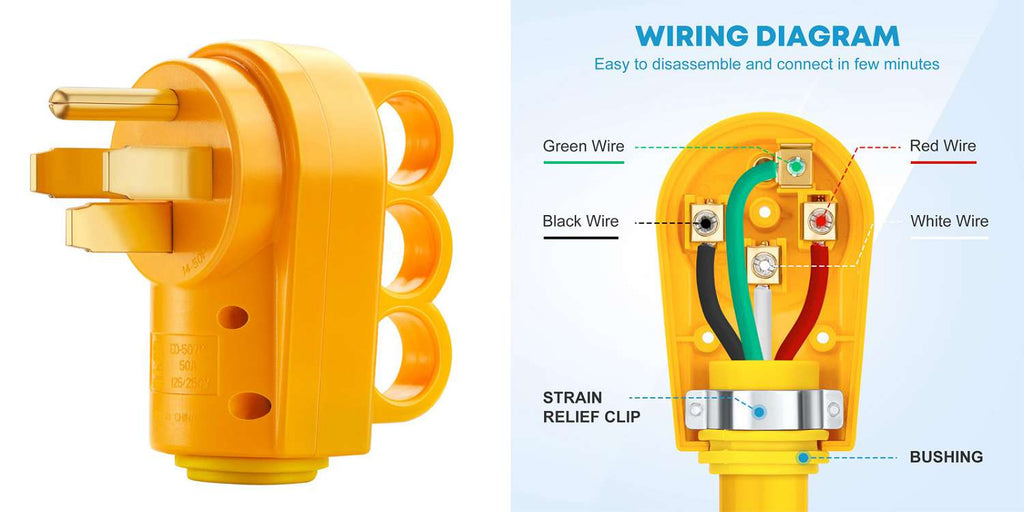
Types of RV Plug Adapters
Having the ability to adapt your RV's power inlet to various electrical sources is key to seamlessly operating all your appliances and devices on the road. When using plug adapters in your camper, it's crucial to understand electrical compatibility to ensure safe and effective operation of your electrical system. Here, we'll discuss the importance of compatibility and introduce three common types of RV plug adapters: Dog Bone Adapters, Round Adapters, and Y Adapters.
Dogbone Adapters
Dog Bone Adapters are essential accessories for camper owners, providing a simple yet effective solution for addressing electrical compatibility issues on the road. These adapters, named for their distinctive shape resembling a dog bone, serve as versatile connectors that allow RVers to bridge the gap between different plug types. Whether converting a 30-amp plug to a 50-amp receptacle or vice versa, Dog Bone Adapters offer convenience and flexibility, enabling RVers to access power sources at various campsites and RV parks with ease. Their compact design and affordability make them a practical addition to any RV toolkit, ensuring reliable electrical connections wherever your adventures take you.

Round Adapters
They are integrated cable management, they are built-in cable storage. The round adapters is the potential for overheating, especially when running appliances that draw higher amperage. When constantly operating at or near the adapter's rated amperage, the lack of venting can cause heat buildup inside the round adapter over time. This excess heat risks damaging the adapter's internal components or even melting the casing in worst cases. Rotating between multiple adapters to allow cooling periods is also recommended for prolonged high amp usage.
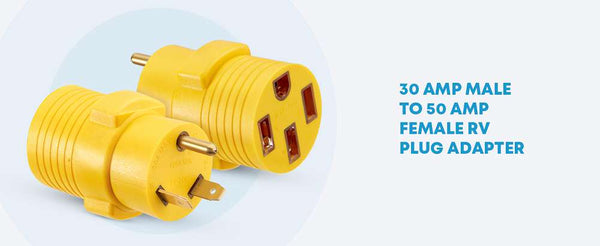
Y-adapters
Y-adapters provide the versatility of splitting a single electrical supply into multiple outlets, allowing trailer owners to power multiple devices simultaneously. With a Y-configuration on one end and two plugs on the other, these heavy-duty adapters can connect two RVs to share a single pedestal hookup or run large appliances simultaneously with accessories. The splitting capability is a major advantage when facing limited outlets at campsites. However, care must be taken not to overload circuits by ensuring the combined electrical loads don't exceed the Y-adapter's rated input amperage. Using Y adapters with high-power appliances or devices may lead to overloaded circuits or tripped breakers, potentially causing electrical problems or safety hazards.
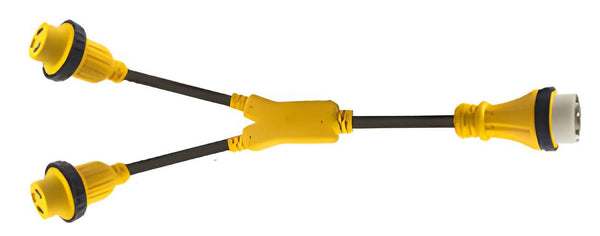
Among these three types of RV plug adapters, Dog Bone Adapters stand out as the most popular and useful choice for many RV owners. Dog Bone Adapters offer a combination of compact design, affordability, and compatibility, making them widely accessible and practical for various electrical compatibility issues encountered during camper travel. They are straightforward to use and provide a simple solution for converting between different plug types.
Ultimately, the Dog Bone Adapter stands out as the preferred choice for many RV owners due to its simplicity, versatility, and widespread availability. However, the suitability of an adapter ultimately depends on individual needs and preferences, so it's essential to consider factors such as power requirements, durability, and ease of use when selecting the right RV plug converter for your trailer. Regardless of the type chosen, understanding electrical compatibility and using adapters safely is paramount to ensuring a hassle-free and enjoyable RVing experience.
Factors to Consider When Choosing an RV Plug Adapter
With the diverse array of electrical setups at campgrounds and RV parks, selecting the right RV plug converter becomes a critical aspect of ensuring seamless power connectivity during your travels. It's essential to consider several key factors when choosing an RV plug adapter, guiding you in selecting the suitable RV plug adapter for your needs.
Electrical Requirements:
Understanding the power needs of your trailer and the available power sources is essential. Determine the amperage and plug configurations required by your RV's electrical system, as well as the types of power sources commonly found at campgrounds or trailer parks. Take stock of your RV's amperage rating, which will most likely be either 30A or 50A service, as well as its voltage needs of 120V AC and/or 12V DC systems. With those core electrical requirements identified, you can then opt for an adapter rated to safely handle the maximum electrical loads your camper may demand without risk of overheating the adapter or tripping circuit breakers on the power supply end. This will help you choose the right adapter to match your RV's electrical specifications and ensure a reliable power connection.
Durability and Quality:
Durability should be the top priority when selecting an RV plug adapter. These devices will be repeatedly plugging and unplugging, coiling and uncoiling, and exposure to the harsh outdoor elements that come with the RVing lifestyle. Look for adapters constructed with heavy-duty, weather-resistant materials that can withstand downpours, freezing temperatures, baking sun, and incidental impacts without cracking or breaking. And for the heat that builds up during high electrical loads, opt for adapters specifically engineered with heat-resistant housings and internal wiring that won't melt or degrade prematurely. A durable RV plug converter will withstand the rigors of trailer travel and provide long-lasting performance, reducing the risk of malfunctions or failures.
Compatibility with Campground Hookups:
Achieving a secure electrical connection requires the adapter to precisely match both the trailer power inlet and the outlet itself. Ensure that the adapter matches the electrical outlets commonly found at campgrounds or RV parks where you plan to stay. Different campgrounds may have varying types of electrical hookups, so it's important to choose a RV plug converter that is compatible with the most commonly used configurations. This will ensure seamless connections and prevent compatibility issues during your travels.
By considering these factors when choosing an RV plug adapter, you can ensure compatibility, safety, and reliability in your electrical connections during trailer travel. Prioritize understanding your RV's electrical requirements, selecting a durable and high-quality adapter, ensuring compatibility with campground hookups, and choosing weather-resistant adapters for outdoor use to enhance your overall RVing experience.
Types of Kohree RV Adapters
RV Plug Dogbone Electrical Adapter
Kohree provides two versatile adapter options to allow RVers to connect to various power sources at campsites. These durable adapters convert mismatched amperage between your camper and the available pedestal outlets.
Kohree 30AMP to 50AMP adapter has 30AMP (TT-30P) male to 50AMP (14-50R) female adapter for you to convert the power at a campground to fit for your 50A RV (NOT for EV or Tesla Model Y), an easy power conversion. If you have a 30-amp trailer but only 50-amp pedestals available, 50AMP to 30AMP adapter has you covered. The 50AMP (14-50P) male to 30AMP (TT-30R) female adapter for you to convert the power at the campground to fit for your 30A RV, an easy power conversion.
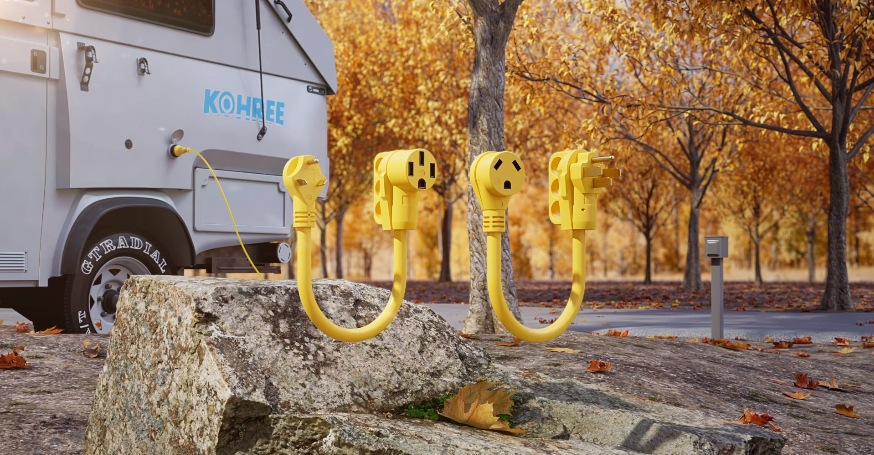
Flexible 18" RV Power Adapter(only for 30A/50A adapters): This longer 18-inch dogbone adapter provides ample flexibility when connecting power sources to your camper. It allows the cord to bend a full 180 degrees between the male and female ends. Never be limited by short, rigid adapters again. The increased length and supreme bendability ensure a hassle-free connection every time.
Effortless Connections with Ergonomic Grip Handle Design: Kohree RV power adapter features intelligently designed ergonomic grip handles on both the male and female end connectors. The grip handles make removing the adapter from an outlet or power inlet a simple, smooth and effectively saving physical strength.
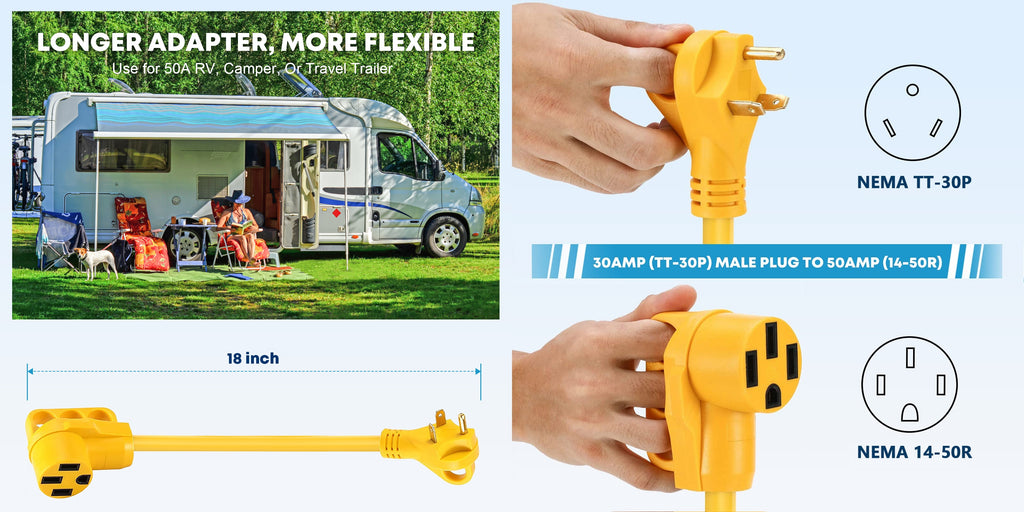
Well Constructed: Kohree RV electrical adapter cord is engineered for durability and longevity. Constructed with 100% copper wiring to ensure optimal conductivity, it's then coated with a heavy-duty, flame-retardant PVC sleeve that shields the cord from outdoor elements, wear and tear.
Wide Applicability: Kohree RV adapter offer wide-ranging compatibility to keep your home-on-wheels running seamlessly. Whether you're driving a compact camper van or trailer, this RV plug converter ensures you have constant access to electrical power. Quickly establish a reliable connection to energize your camper's vital appliances and amenities, from the refrigerator and air conditioner to the microwave, coffee maker, and interior lighting.
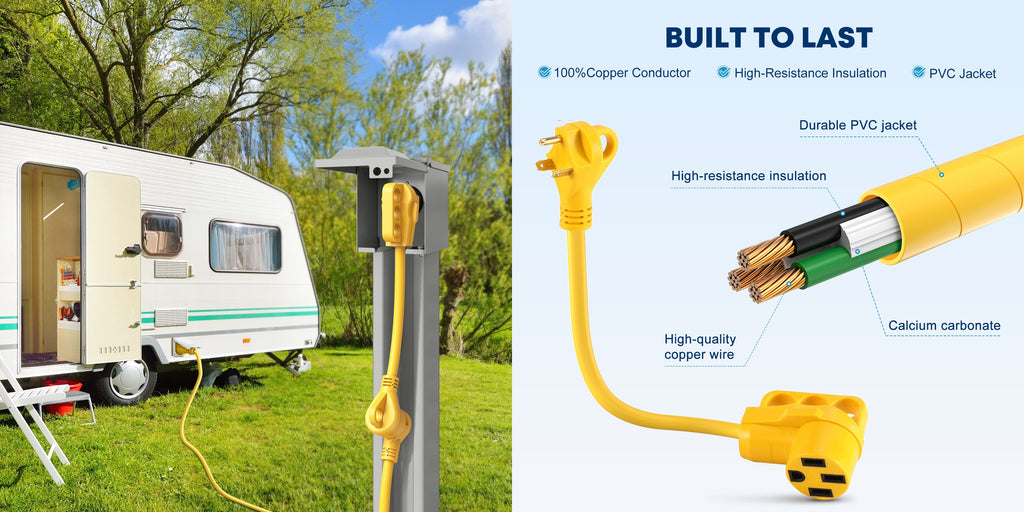
RV Dogbone Electrical Adapter Cord with Twist Lock
To power up your travel trailer while at home or outdoors, which is equipped with a twist lock adapter power inlet and needs to plug into a 15amp household power outlet. Available in 30 and 50 amp adapters. This type of RV plug converter is usually connecting to RV power extension cord, then the extension cord can plug into a standard 15A household outlet.
Kohree offers two variations of their RV Dogbone Electrical Adapter Cord with Twist Lock to accommodate different power needs. Kohree 30 Amp to 15 Amp 110V has MALE Plug 15Amp is NEMA 5-15P, 125V. FEMALE Receptacle plug 30Amp is NEMA L5-30R, 125/250V, Load 1875W, 10/3 gauge STW wire. 50 Amp to 15 Amp 110V includes MALE Plug 15Amp is NEMA 5-15P, 125V. FEMALE Receptacle plug 50Amp is NEMA SS 2-50R, 125/250V. Simply select the adapter cord that matches your RV's amperage rating to ensure safe, efficient electricity supply no matter where your travels take you.
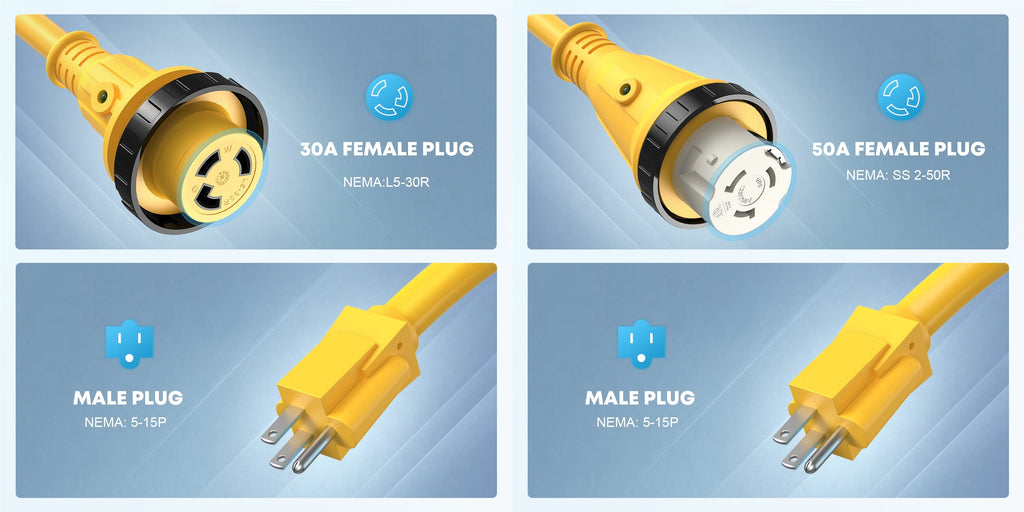
Twist Locking Receptacle: The female locking connector features a watertight molded plug accompanied by a threaded ring. This ring allows the receptacle to securely mate with the male plug end by twisting it on, creating a weatherproof seal. The twist locking ring provides a reliable mechanical lock to ensure a weatherproof connection during trailer travel or camping periods.
LED Power Indicator: Designed with the LED power indicator will glow green when there is power, providing at-a-glance visibility into its operating status. This handy LED illuminates a bright green when the RV plug converter is properly connected and receiving electrical power from the outlet or power pedestal.
Safety: This dogbone RV electrical adapter utilizes heavy-duty polyvinyl plastic , 100% copper 10/3 gauge STW wire compounds able to withstand extreme temperatures, UV exposure, and abrasion without cracking or degradation. The sturdy PVC exterior shields the internal wiring from damage during trailer travel. The 100% copper core provides optimal current carrying capacity and conductivity.
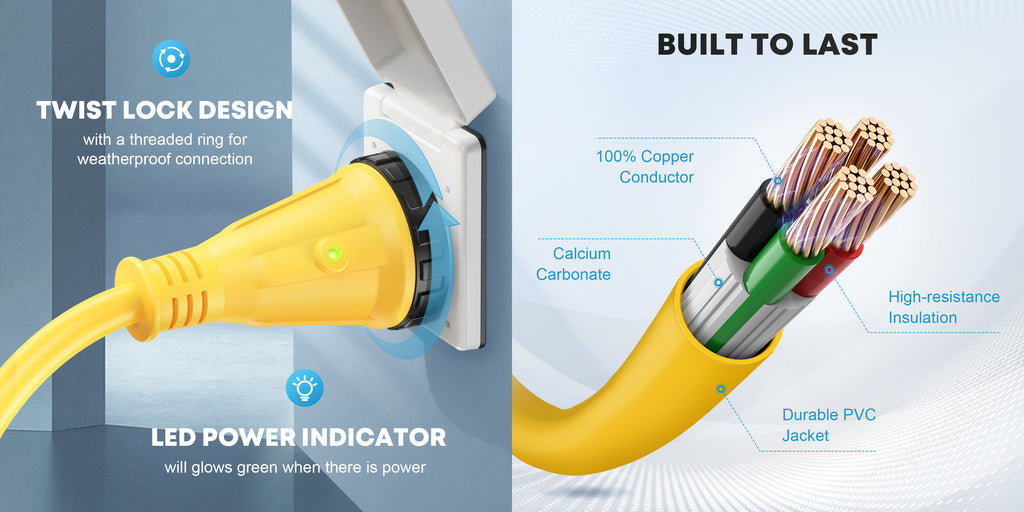
Are RV outlets the same as house outlets?
While RV outlets and household outlets may share similar physical appearances, they diverge significantly in their electrical specifications and intended usage. RV outlets generally offer lower voltage and amperage compared to standard household outlets, with common configurations including 120 volts AC at 30 amps or 240 volts AC at 50 amps for larger trailers. These outlets are specifically designed to meet the unique power needs of RVs and are commonly found at campgrounds and camper parks.
There are two main scenarios for RVers looking to run their RV's electrical system from a standard 15-amp household outlet and power supply that will be described the next part.
What RV Adaptors Do I Need For My RV?
When taking RV on the road, having the right electrical adapters is crucial for safely connecting to the power sources provided at campgrounds and RV parks. Most campsites offer either 30-amp or 50-amp electrical pedestals, so we need to better prepared with the proper RV plug converter and power cords.
If you have a 50-amp trailer but are attempting to connect to a 30-amp campsite power source, Kohree 30 Amp to 50 Amp RV Plug Adapter is the solution. This adapter, featuring a NEMA 14-50R on one end to connect to your trailer's 50-amp cord inlet and a NEMA TT-30P on the other end for the 30-amp RV site power source, ensures seamless compatibility and safe power transfer. With this adapter in hand, you can enjoy peace of mind knowing that you can connect your camper to various power sources without any hassle.
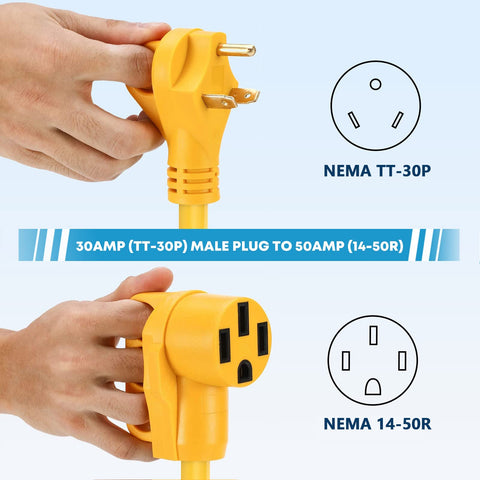
If your 30-amp RV and are seeking to connect to a 50-amp campsite power source,look no further than the Kohree 50 Amp to 30 Amp RV Adapter. This RV plug converter facilitates a connection, featuring a NEMA TT-30R on one end to connect to your RV's 30-amp power cord inlet and a NEMA 50P plug on the other end for the 50-amp RV site power source. This RV plug converter provides the assurance you need to seamlessly connect your RV's electrical system with the powered outlets at campgrounds, guaranteeing dependable access to power throughout your travels.
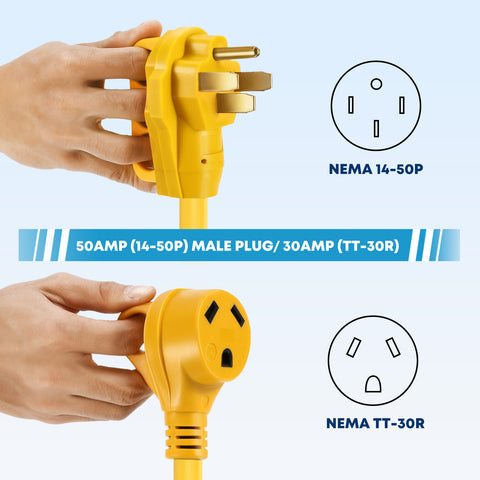
How Do I Power My RV From Home?
If you want to power trailer directly from home's electrical system, you need to do so safely requires the right equipment. Most household outlets are 15-amp circuits, while trailer electrical systems are either 30-amp or 50-amp. So RVers will need to prepare with the proper adapters to step down from the RV's power needs to what a standard 15-amp household outlet can supply.
A 30A RV needs to be powered from a 15A electric outlet at home, there are two options available.
- You'll need a 30A to 15A adapter with twist lock, which features NEMA L5-30R and NEMA 5-15P. This RV plug converter allows NEMA L5-30R on one end to connect with the camper, while the NEMA 5-15P end connects to the 15AMP power extension cord, ultimately linking to the 15Amp power source.
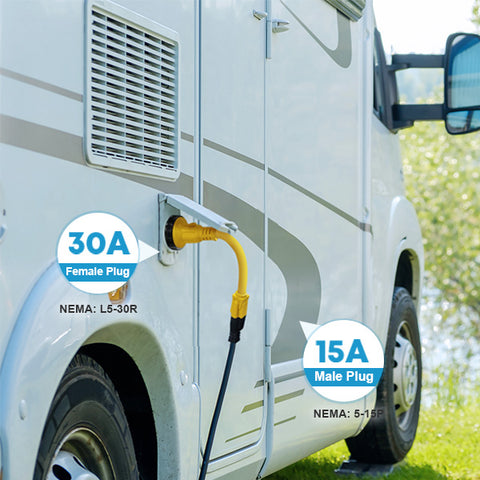
- An alternative option involves connecting the 30A power cord to Kohree 15A Male to 30A Female RV Power Adapter. This RV plug converter, equipped with a NEMA 5-15P Male and TT-30R Female, facilitates the connection. TT-30R Female on one end connect with the power cord, Subsequently, NEMA 5-15P Male end connects to the 15A power source seamlessly.
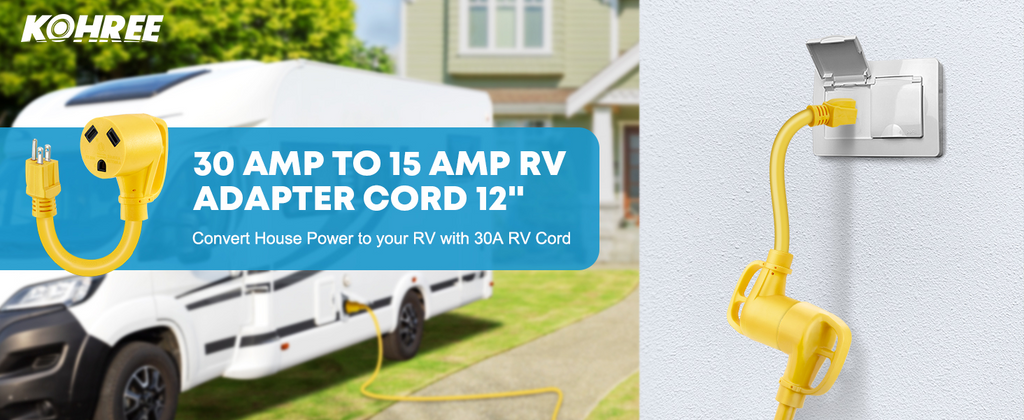
When a 50A RV requires power from a 15A electric outlet at home, two options are at hand.
- For connecting a 50A RV to a 15A power source, prepare a Kohree 50 Amp to 15 Amp 110V RV Adapter Plug with Twist Lock. It features a NEMA SS 2-50R for the 50A RV power plug, with a NEMA 5-15P on one end to connect to a 15A extension power cord. This extension cord can then link to the 15A power source effortlessly.
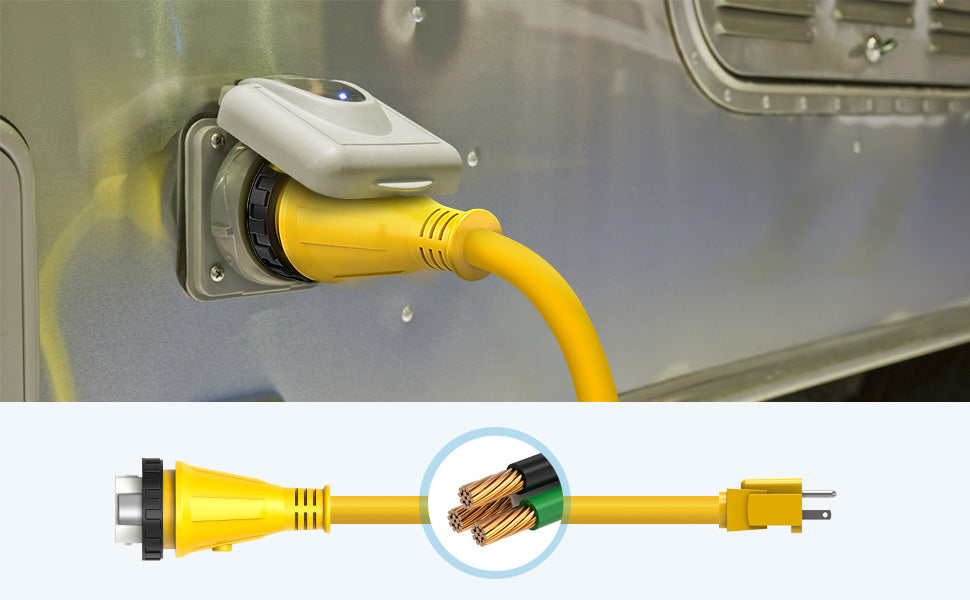
- The second option to run 50-amp RV off a standard 15-amp household power source, you'll need a 50A extension power cord as well as the Kohree 50A to 15A RV adapter plug. Utilize a 50A extension power cord (comprising a NEMA 14-50P and NEMA SS2-50R). On one end of the extension cord, the NEMA SS2-50R side connects to the 50A RV power inlet. On the other end, the 50 NEMA 14-50P plugs into the Kohree 50 amp to 110V Adapter RV Plug. Finally, the adapter's NEMA 5-15P end ultimately connects to a 15A power source.
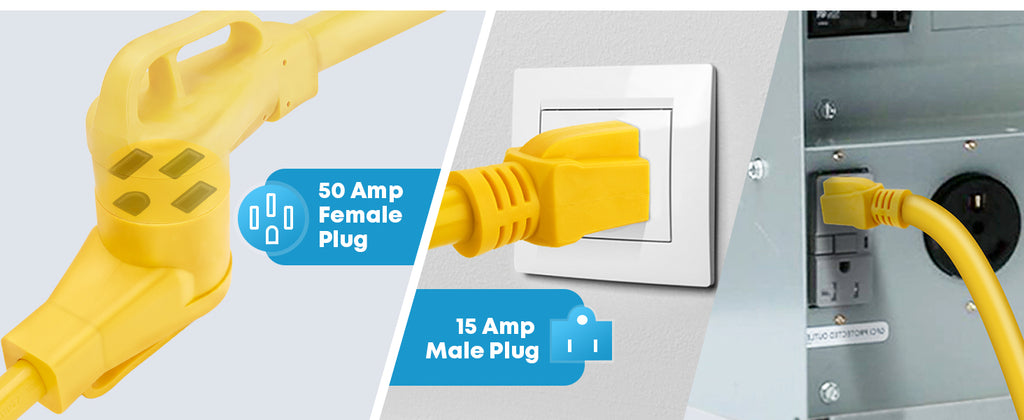
Can I Use A Surge Protector?
Connecting a surge protector before the adapter can safeguard your RV's electrical system and sensitive electronics. Surge protectors act as a critical barrier, preventing harmful voltage fluctuations and sudden spikes from reaching your RV's components.
If you want to know how many joules of surge protection you need for your trailer, you can refer to "How to Choose the Best Surge Protector for Your RV" for detailed guidance on selecting the most suitable surge protector for your specific needs.
Additionally, you can now get RV adapters that have built-in surge protection circuitry, providing an additional layer of defense against electrical hazards. These adapters combine the convenience of adapting to different power sources with the added benefit of surge protection, simplifies setup by combining two essential pieces of equipment into one convenient unit.
RV adapters with built-in surge protection come at a higher price than standard RV plug converter. If you have a fixed power source, investing in one of these combo units can be convenient. However, if you frequently switch between different power sources requiring various adapters, maybe purchasing separate surge protectors along with the needed adapters may be more cost-effective than buying multiple integrated adapter with surge protector units. Choose an RV surge protector or adapter with surge protection based on your specific power needs and trailer electrical system requirements.
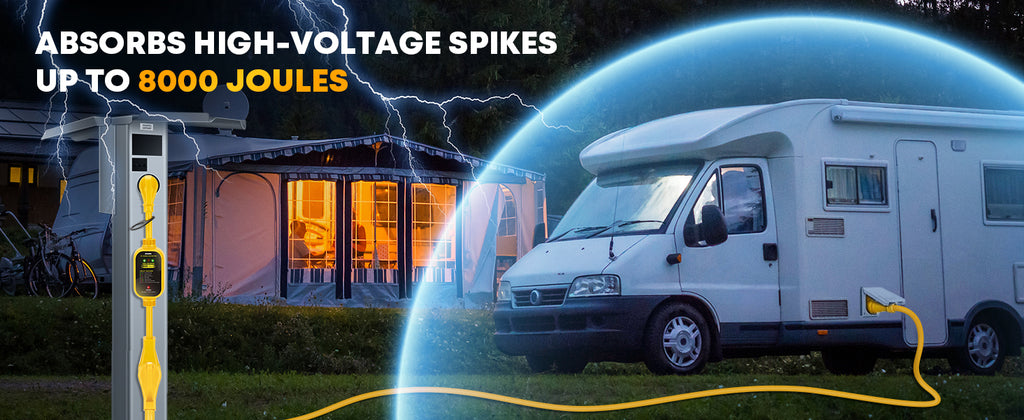
Share


















































